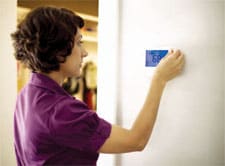
Electric bills vary with the seasons, driven by weather and consumer-use patterns.
Weather is the single biggest driver of power bills. How much weather affects your electric bill depends on many factors, including your home’s original construction materials, insulation, air leaks, and HVAC efficiency. Personal comfort plays a role, too, as does the difference between the thermostat setting inside and temperatures outdoors.
A key factor is member controlled. When a house stays at 68 degrees Fahrenheit, but the outdoor temperature drops to near freezing, demand for heating can be significant. Warm air leaving a home essentially wastes the money spent to heat it.

YEC members with properly efficient working heat pumps enjoy some of the most efficient heating. The co-op recommends a relatively constant thermostat setting of 68 degrees during the heating season. Avoid advancing the thermostat more than two degrees at any time. This will cause the auxiliary heat to come on. Auxiliary heat is heat strips that supplement the heat pump. They will come on when it gets near or below freezing to provide extra heat, but by adjusting the thermostat up more than two degrees you can cause them to come on when they are not needed.
Only use the “emergency” heat setting if the heat pump is not working properly. Basically, this setting turns off the heat pump and makes the unit an electric furnace. You use two or three times more energy than you would with the regular heat pump setting.
Having the heat pump serviced before the heating season can help ensure that it is working properly. An annual service will extend the life of the equipment and help it run efficiently, saving you money.
Brent Clinton
Key Accounts Representative & Energy Specialist
 101 energy tips
101 energy tips
Your Touchstone Energy Cooperative has compiled a list of low-cost/no-cost energy-saving measures to help you better manage your home’s energy cost. Download the brochure PDF here or stop by one of our offices and pick one up.
Energy Use FAQ
Yes. York Electric offers a free in-home energy audit. All you have to do is call our member services department at 803–684‑4248 and tell them you are interesting in scheduling one.
The ideal setting is 78 degrees for cooling and 65 degrees for heating.
Yes, it can. You can save by using your current spotlights less, converting your current spotlights to 23 watt compact fluorescent spots, and by installing motion sensors so the lights only work when motion is detected.
The value of electricity remains very high. The national cost of electricity today, when adjusted for inflation, is less than what it was in 1980. Very few commodities have remained such a good value. Compared to other consumer products and services, electricity is a bargain.
Conserving energy is always a good idea. York Electric has a free 101 low-cost/no-cost home energy savings measures brochure. Visit one of our offices to pick up a copy or view and/or download here. Also, visit TogetherWeSave.com and take the home tour to learn what actions you can take to save on your energy bill.
101 Energy Tips
Energy Audits
